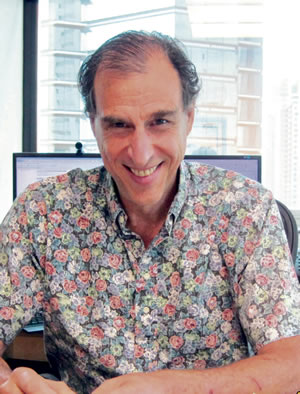Roger Epstein

“If you don’t forgive someone, at some point it is like taking poison and expecting the other person to die,” tax attorney Roger Epstein says in his office at Cades Schutte LLP. Right now, the office is in the midst of its weekday bustle, but on every second Friday, things slow down a little when the office becomes headquarters for the Hawaii Forgiveness Project’s monthly meetings.
The Hawaii Forgiveness Project was founded in 2002 by a group of businesspeople and lawyers in the downtown area as a way to encourage forgiveness, gratitude and caring. Epstein got involved with the group soon after it launched. “I personally believe that one of the main purposes for us being here is to be of help to other people,” he says. One way to be of service to others, he says, is to live with the kind of compassion that the group promotes.
“Of course it is different things to different people, but the basic idea of forgiveness that we got from interviewing hundreds of different religious, business and military groups, is that a significant part of (forgiveness) is letting go of the past,” he says. “The Forgiveness Project is a platform and it is a catalyst for change. It is a place you can come to and get some information to help you get inspired to move forward.”
Next Sunday (Aug. 5), the group hosts its signature event, the 10th annual Hawaii International Forgiveness Day from 4 to 7 p.m. at the State Capitol Auditorium. It will feature a discussion of forgiveness in politics, a performance by slack key guitarist Keola Beamer and more.
The Hawaii Forgiveness Project works with different methods to achieve forgiveness and gratitude, including various forms of attitudinal healing and meditation. Its monthly meetings also entail group discussions and provide a venue for people to share their personal experiences. Occasionally, the group also hosts guest speakers. Last week, for example, a visiting researcher spoke about his study on the effectiveness of forgiveness.
One of the primary benefits of these meetings, Epstein says, is that they allow people to take a step back and evaluate themselves and the situation. “Forgiveness is not about somebody else,” he asserts. “The first thing you have to do is recognize what is going on with you.”
Epstein also has been instrumental in creating a related project called the Voyage of Aloha – the central idea being that we are connected to one another. “When you understand that connectedness, it becomes a lot easier to forgive,” he says. “If we really recognized our connectedness, we would deal with others differently.”
Hawaii International Forgiveness Day is free and open to the public. For more information, visit hawaiiforgivenessproject.org or email service@hawaiiforgivenessproject.org or call 216-1993.





